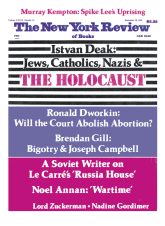The following statement was issued during the election campaign in Poland last April. It was published this summer by the journal Kultura in Paris and has been translated by William Hunt.
Living among us in Poland there are Ukrainians and Byelorussians, smaller groups of Lithuanians, Jews, Slovaks, Germans, Czechs, Armenians, Tatars, members of the Russian and Greek Orthodox Churches, and Protestants. This is our rare and precious heritage from the multinational Commonwealth of earlier days.*
At this moment, when national hopes are reawakening, we must also revive the old Commonwealth’s tradition of tolerance and respect, in the name of our common past, and our common future.
These people living among us, who in most cases have lived among us for many generations, bear the same burdens as we Poles do. Their fears and hopes resemble our own. But they have, in addition, their own specific anxieties: they are concerned for the preservation, within the Polish environment, of their own religious and ethnic identity. They are concerned for their cultures, their schools, their churches. They want dignity, without having to “change into Polish clothes.” They want education for their own people; churches for their own children.
Let us especially remember these neighbors and fellow citizens of ours during the current electoral campaign, even when we are most pressed for time and resources. Let us find responsible positions for them in this campaign, so that they may participate with the dignity to which they are entitled. This is our human and moral duty—as the Holy Father, Pope John Paul II, so emphatically reminded the world in his recent statement on respect for national minorities. It is also our political, and specifically Polish, duty. After all, we have millions of Poles living beyond our present frontiers, and we naturally demand that their identity and civil rights be respected.
In our common history there have been many conflicts and mutual injustices. Memories and grievances survive, unfortunately, to this day. But let us not permit these feelings, these “justifications,” to prevent reconciliation—at such an important time. And let us not permit anyone to exploit our differences!
Members of national and religious minorities are to be found, in greater or lesser numbers, in every electoral district in Poland. Our candidates should devote the proper consideration to these fellow citizens and to their concerns. (And not only in your electoral promises, gentlemen, but in your later work in Parliament!)
This will be one of the most important tests of the real competence of our senators and deputies. Their task will be to inaugurate, through their skill, honesty, and humanity, a new period in Polish history: a closing of the accounts of mutual guilt and injustice, and the opening of a new age, an age equal to the demands of the imminent third millennium after Christ, an age when citizens of all nationalities, cultures, and religions will live together in justice on the banks of the Vistula.
—Warsaw, April 27, 1989
This Issue
September 28, 1989
-
*
Translator’s note: Walesa is referring here to the Polish-Lithuanian Commonwealth, which lasted from 1386 until its dismemberment and annexation by Russia, Prussia, and Austria at the end of the eighteenth century.
↩



